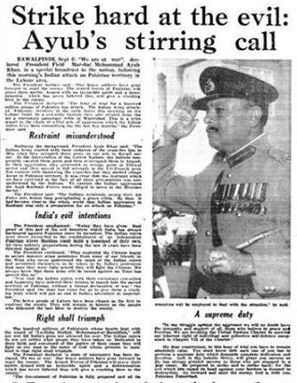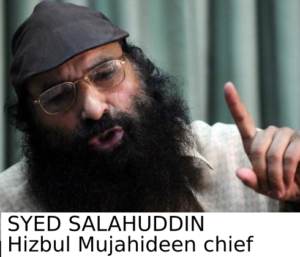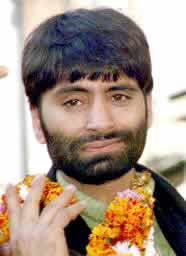
NIA attaches property of incarcerated Hurriyat (G) leader Ayaz Akbar in Srinagar
[GreaterKashmir] National Investigation Agency (NIA) Tuesday attached the property of incarcerated Hurriyat (G) leader Ayaz Akbar in Shalteng area of Srinagar.
Quoting officials, news agency—Kashmir News Observer (KNO) reported that NIA pasted the notice of attachment on the immovable property that read “this is to inform all members of the public that the immovable property ie. land measuring 1 Kanal and 10 Marias under Survey No, 31 at mauza Shalteng Tehsil Srinagar (J8K), in the name of Muhammad Akbar Khanday So Ab. Rehman Khanday, R/o Malora near Imam-ul-Bana Masjid, P.S Parimpora, Srinagar, J&K, as Abadi Deh, has been attached under the Court Orders dated May 31, 2023 in RC-101 20177 NIA/ DLI, by the Special NIA Court, Patiala House Courts, New Dehli.” Muhammad Akbar Khanday is the father of Ayaz Akbar, who is presently serving detention in New Delh’s Tihar Jail since past six years. Ayaz Akbar’s wife passed away in April this year after losing battle to cancer.
NIA attaches two more properties in terror funding case in Kashmir
[GreaterKashmir] A day after attaching 17 properties of Zahoor Ahmed Shah Watali, the National Investigation Agency (NIA) on Tuesday attached two more properties, belonging to another accused, in the Hurriyat terror funding case in Kashmir
...a disputed territory lying between India and Pakistain. After partition, the Paks grabbed half of it and call it
Azad (Free) Kashmir. The remainder they refer to as "Indian Occupied Kashmir". They have fought four wars with India over it, the score currently 4-0 in New Delhi's favor. After 72 years of this nonsense, India cut the Gordian knot in 2019, removing the area's special status, breaking off Ladakh as a separate state, and allowing people from other areas to settle (or in the case of the Pandits, to resettle) there....
, the agency said in a statement.
The properties of All Party Hurriyat Conference (APHC)
...an alliance of 26 political, social and religious Moslem organizations formed in 1993 as a united political front to raise the cause of Kashmiri separatism. In other words, a willing tool of Pakistan...
separatist leader Mohammad Akbar Khanday include nine kanal land and a 2-storeyed house in Srinagar. These have been attached on the orders of Special NIA Court, New Delhi, under section 33(1) of UAPA. "Khanday, currently in Tihar Jail facing trial in the terror funding case, was the Spokesperson/ Media advisor of Hurriyat Conference (G). He was raising and collecting funds from within India and abroad through various illegal channels and was using the same to sponsor and promote separatist and terrorist activities in Jammu and Kashmir," the NIA said.
The statement said that Khanday, who was closely connected with other separatist leaders of the APHC, was operating in close association with Hizb-ul-Mujahideen (HM) and he used to collect funds for unlawful and
The case, filed suo moto by NIA in May 2017, relates to terrorist and secessionist activities being carried out by ISI-backed proscribed terrorist organizations in Jammu and Kashmir. These banned outfits, including Lashkar-e-Taiba
...the
Army of the Pure,an Ahl-e-Hadith terror organization founded by Hafiz Saeed. LeT masquerades behind the Jamaat-ud-Dawa facade within Pakistain and periodically blows things up and kills people in India. Despite the fact that it is
banned, always an interesting concept in Pakistain, the organization remains an blatant tool and perhaps an arm of the ISI...
(LeT), Jaish-e-Mohammad
...literally
Army of Mohammad, a Pak-based Deobandi terror group founded by Maulana Masood Azhar in 2000, after he split with the Harkat-ul-Mujaheddin. In 2002 the government of Pervez Musharraf
bannedthe group, which changed its name to Khaddam ul-Islam and continued doing what it had been doing before without missing a beat...
(JeM), Jammu and Kashmir Liberation Front (JKLF) etc, were using the APHC as a front for their activities, NIA investigations stated. They were spreading terror and perpetrating violence in the Kashmir valley by promoting and conducting attacks on civilians and security forces, it said.
The agency has so far filed chargehsheets against 17 persons, including Hafeez Saeed, the Amir of Jamaat-ud-Dawa
...the front organization of Lashkar-e-Taiba...
h and LeT and a UN listed terrorist, as well as Mohd. Yusuf Shah@ Syed Salahuddin
 ...the aging, morbidly obese chief of Hizbul Mujaheddin and the titular head of the United Jihad Council in idyllic Kashmire. Originally owned body and theoretical soul by Jamaat-e-Islami he and his organization are currently controlled by Pakistain's ISI. Salahuddin's hobbies include crocheting doilies shaped like the Taj Mahal, combing his enormous beard, and eating....
...the aging, morbidly obese chief of Hizbul Mujaheddin and the titular head of the United Jihad Council in idyllic Kashmire. Originally owned body and theoretical soul by Jamaat-e-Islami he and his organization are currently controlled by Pakistain's ISI. Salahuddin's hobbies include crocheting doilies shaped like the Taj Mahal, combing his enormous beard, and eating...., the Chief of Hizb-ul-Mujahideen (HM).
Related:
Hurriyat: 2023-05-04 Senior separatist among 3 found involved in terror funding: SIA
Hurriyat: 2023-04-05 Residences of two Hurriyat leaders among six locations raided by SIA in Kashmir: Officials
Hurriyat: 2023-03-05 NIA attaches property of militant comdr killed in Pak
Hurriyat: 2023-05-04 Senior separatist among 3 found involved in terror funding: SIA
Hurriyat: 2023-04-05 Residences of two Hurriyat leaders among six locations raided by SIA in Kashmir: Officials
Hurriyat: 2023-03-05 NIA attaches property of militant comdr killed in Pak

.jpg) ...a disputed territory lying between India and Pakistain. After partition, the Paks grabbed half of it and call it
...a disputed territory lying between India and Pakistain. After partition, the Paks grabbed half of it and call it  ...a Pak political shape-changer. He is undistinguished except for his habit of periodically needing to have his lips reattached...
...a Pak political shape-changer. He is undistinguished except for his habit of periodically needing to have his lips reattached... ...chairman of one of the two factions of Jammu Kashmir Liberation Front. JKLF is a Kashmiri nationalist organization founded in Birmingham, UK in 1977. Branches weren't actually established in Kashmir for another ten years. It has the usual demands for separation of J&K from secular India so it can become an independent Islamic rathole. It seems to have no interest in Pak Kashmir breaking away to join it. In 1994 Malik renounced violence after he was released from jail and from that point he and his organization pursued peaceful means to impose their will on the region...
...chairman of one of the two factions of Jammu Kashmir Liberation Front. JKLF is a Kashmiri nationalist organization founded in Birmingham, UK in 1977. Branches weren't actually established in Kashmir for another ten years. It has the usual demands for separation of J&K from secular India so it can become an independent Islamic rathole. It seems to have no interest in Pak Kashmir breaking away to join it. In 1994 Malik renounced violence after he was released from jail and from that point he and his organization pursued peaceful means to impose their will on the region...